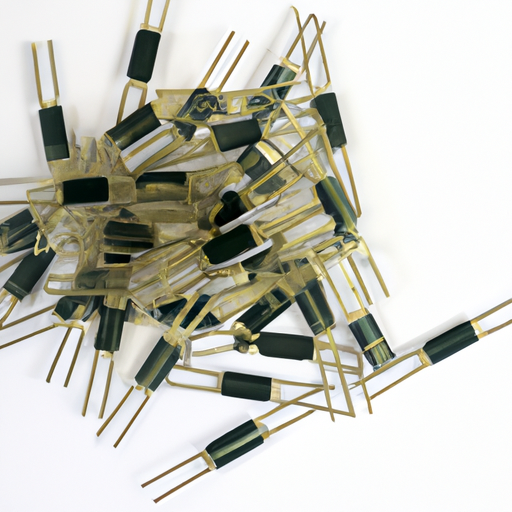What Industries Are the Application Scenarios of Glass Glaze Resistors Included In?

I. Introduction
In the world of electronics, resistors play a crucial role in controlling the flow of electric current. Among the various types of resistors, glass glaze resistors stand out due to their unique properties and versatility. These resistors are made from a glass-based material that provides excellent stability and performance in a wide range of applications. This article aims to explore the characteristics of glass glaze resistors, the industries that utilize them, specific application scenarios, and the advantages and challenges associated with their use.
II. Characteristics of Glass Glaze Resistors
A. Composition and Manufacturing Process
Glass glaze resistors are typically composed of a mixture of metal oxides and glass materials. The manufacturing process involves applying a glass glaze to a ceramic substrate, followed by a firing process that solidifies the materials and creates a durable resistor. This unique composition allows glass glaze resistors to exhibit high stability and reliability under various environmental conditions.
B. Key Properties
1. **High Stability**: Glass glaze resistors are known for their excellent thermal stability, which makes them suitable for applications that require consistent performance over a wide temperature range.
2. **Temperature Resistance**: These resistors can withstand high temperatures without significant changes in their electrical properties, making them ideal for use in demanding environments.
3. **Moisture Resistance**: The glass glaze provides a protective barrier against moisture, ensuring that the resistors maintain their performance even in humid conditions.
4. **Electrical Performance**: Glass glaze resistors offer low noise and high precision, which are essential for many electronic applications.
C. Comparison with Other Types of Resistors
Compared to other resistor types, such as carbon film or metal film resistors, glass glaze resistors provide superior stability and environmental resistance. While they may be more expensive to produce, their long-term reliability often justifies the cost in critical applications.
III. Overview of Industries Utilizing Glass Glaze Resistors
A. Electronics and Consumer Goods
Glass glaze resistors are widely used in the electronics and consumer goods industries. They can be found in various home appliances, such as washing machines, microwaves, and refrigerators, where they help regulate voltage and current. Additionally, consumer electronics like televisions, audio systems, and gaming consoles rely on these resistors for optimal performance.
B. Automotive Industry
The automotive industry has increasingly adopted glass glaze resistors, particularly in automotive electronics. These resistors play a vital role in managing the electrical systems of vehicles, including engine control units, infotainment systems, and safety features. With the rise of electric vehicles (EVs), glass glaze resistors are also being utilized in battery management systems to ensure efficient energy use and safety.
C. Telecommunications
In the telecommunications sector, glass glaze resistors are essential components in communication devices, such as routers, switches, and signal amplifiers. They help maintain signal integrity and reliability, which are critical for network infrastructure and data transmission.
D. Industrial Automation
Glass glaze resistors find applications in industrial automation, particularly in control systems and robotics. They are used to ensure precise control of machinery and processes, contributing to increased efficiency and productivity in manufacturing environments.
E. Medical Devices
The medical device industry relies on glass glaze resistors for various applications, including diagnostic equipment and patient monitoring systems. Their high stability and reliability are crucial in ensuring accurate readings and safe operation in medical environments.
F. Aerospace and Defense
In the aerospace and defense sectors, glass glaze resistors are used in avionics and military equipment. Their ability to withstand extreme conditions and provide reliable performance makes them suitable for critical applications where failure is not an option.
IV. Specific Application Scenarios
A. Power Supply Circuits
Glass glaze resistors are commonly used in power supply circuits for voltage regulation and current limiting. They help maintain stable voltage levels and protect sensitive components from overcurrent conditions.
B. Signal Processing
In signal processing applications, glass glaze resistors are utilized for filtering and impedance matching. They help ensure that signals are transmitted accurately and without distortion, which is essential for high-quality audio and video applications.
C. Temperature Sensing
Glass glaze resistors can also be found in temperature sensing applications, such as thermistors. They are used in HVAC systems to monitor and control temperature, ensuring comfort and energy efficiency.
D. Safety and Protection Circuits
Safety and protection circuits often incorporate glass glaze resistors for overcurrent and surge protection. These resistors help safeguard electronic components from damage caused by electrical surges or faults.
V. Advantages of Using Glass Glaze Resistors in Various Industries
A. Reliability and Longevity
One of the primary advantages of glass glaze resistors is their reliability and longevity. Their stable performance over time reduces the need for frequent replacements, making them a cost-effective choice in the long run.
B. Cost-Effectiveness
While the initial cost of glass glaze resistors may be higher than other types, their durability and performance can lead to lower overall costs due to reduced maintenance and replacement needs.
C. Versatility in Design
Glass glaze resistors can be manufactured in various shapes and sizes, allowing for versatility in design. This adaptability makes them suitable for a wide range of applications across different industries.
D. Environmental Resistance
The moisture and temperature resistance of glass glaze resistors make them ideal for use in harsh environments. Their ability to perform reliably in challenging conditions is a significant advantage in many applications.
VI. Challenges and Limitations
A. Manufacturing Constraints
The manufacturing process for glass glaze resistors can be complex and time-consuming, which may limit production capacity and increase costs.
B. Competition with Alternative Technologies
Glass glaze resistors face competition from alternative resistor technologies, such as thin-film and thick-film resistors, which may offer similar performance at a lower cost.
C. Market Demand Fluctuations
The demand for glass glaze resistors can fluctuate based on market trends and technological advancements, which may impact production and pricing.
VII. Future Trends and Innovations
A. Technological Advancements
As technology continues to evolve, glass glaze resistors are likely to benefit from advancements in materials and manufacturing processes. This could lead to improved performance and reduced costs.
B. Emerging Applications
New applications for glass glaze resistors are emerging, particularly in the fields of renewable energy and smart technology. Their reliability and performance make them suitable for use in solar inverters, energy storage systems, and IoT devices.
C. Sustainability Considerations
With increasing emphasis on sustainability, manufacturers are exploring eco-friendly materials and processes for producing glass glaze resistors. This shift could enhance their appeal in environmentally conscious markets.
VIII. Conclusion
Glass glaze resistors play a vital role in various industries, from consumer electronics to aerospace and defense. Their unique characteristics, such as high stability, temperature resistance, and moisture resistance, make them suitable for a wide range of applications. While challenges exist, the advantages of using glass glaze resistors, including reliability and cost-effectiveness, position them well for future growth. As technology advances and new applications emerge, glass glaze resistors will continue to be an essential component in the ever-evolving landscape of electronics.
IX. References
- Academic Journals
- Industry Reports
- Manufacturer Specifications and Guidelines
In summary, glass glaze resistors are integral to many industries, providing reliable performance in critical applications. Their unique properties and versatility ensure that they will remain a key component in the future of electronics.
What Industries Are the Application Scenarios of Glass Glaze Resistors Included In?

I. Introduction
In the world of electronics, resistors play a crucial role in controlling the flow of electric current. Among the various types of resistors, glass glaze resistors stand out due to their unique properties and versatility. These resistors are made from a glass-based material that provides excellent stability and performance in a wide range of applications. This article aims to explore the characteristics of glass glaze resistors, the industries that utilize them, specific application scenarios, and the advantages and challenges associated with their use.
II. Characteristics of Glass Glaze Resistors
A. Composition and Manufacturing Process
Glass glaze resistors are typically composed of a mixture of metal oxides and glass materials. The manufacturing process involves applying a glass glaze to a ceramic substrate, followed by a firing process that solidifies the materials and creates a durable resistor. This unique composition allows glass glaze resistors to exhibit high stability and reliability under various environmental conditions.
B. Key Properties
1. **High Stability**: Glass glaze resistors are known for their excellent thermal stability, which makes them suitable for applications that require consistent performance over a wide temperature range.
2. **Temperature Resistance**: These resistors can withstand high temperatures without significant changes in their electrical properties, making them ideal for use in demanding environments.
3. **Moisture Resistance**: The glass glaze provides a protective barrier against moisture, ensuring that the resistors maintain their performance even in humid conditions.
4. **Electrical Performance**: Glass glaze resistors offer low noise and high precision, which are essential for many electronic applications.
C. Comparison with Other Types of Resistors
Compared to other resistor types, such as carbon film or metal film resistors, glass glaze resistors provide superior stability and environmental resistance. While they may be more expensive to produce, their long-term reliability often justifies the cost in critical applications.
III. Overview of Industries Utilizing Glass Glaze Resistors
A. Electronics and Consumer Goods
Glass glaze resistors are widely used in the electronics and consumer goods industries. They can be found in various home appliances, such as washing machines, microwaves, and refrigerators, where they help regulate voltage and current. Additionally, consumer electronics like televisions, audio systems, and gaming consoles rely on these resistors for optimal performance.
B. Automotive Industry
The automotive industry has increasingly adopted glass glaze resistors, particularly in automotive electronics. These resistors play a vital role in managing the electrical systems of vehicles, including engine control units, infotainment systems, and safety features. With the rise of electric vehicles (EVs), glass glaze resistors are also being utilized in battery management systems to ensure efficient energy use and safety.
C. Telecommunications
In the telecommunications sector, glass glaze resistors are essential components in communication devices, such as routers, switches, and signal amplifiers. They help maintain signal integrity and reliability, which are critical for network infrastructure and data transmission.
D. Industrial Automation
Glass glaze resistors find applications in industrial automation, particularly in control systems and robotics. They are used to ensure precise control of machinery and processes, contributing to increased efficiency and productivity in manufacturing environments.
E. Medical Devices
The medical device industry relies on glass glaze resistors for various applications, including diagnostic equipment and patient monitoring systems. Their high stability and reliability are crucial in ensuring accurate readings and safe operation in medical environments.
F. Aerospace and Defense
In the aerospace and defense sectors, glass glaze resistors are used in avionics and military equipment. Their ability to withstand extreme conditions and provide reliable performance makes them suitable for critical applications where failure is not an option.
IV. Specific Application Scenarios
A. Power Supply Circuits
Glass glaze resistors are commonly used in power supply circuits for voltage regulation and current limiting. They help maintain stable voltage levels and protect sensitive components from overcurrent conditions.
B. Signal Processing
In signal processing applications, glass glaze resistors are utilized for filtering and impedance matching. They help ensure that signals are transmitted accurately and without distortion, which is essential for high-quality audio and video applications.
C. Temperature Sensing
Glass glaze resistors can also be found in temperature sensing applications, such as thermistors. They are used in HVAC systems to monitor and control temperature, ensuring comfort and energy efficiency.
D. Safety and Protection Circuits
Safety and protection circuits often incorporate glass glaze resistors for overcurrent and surge protection. These resistors help safeguard electronic components from damage caused by electrical surges or faults.
V. Advantages of Using Glass Glaze Resistors in Various Industries
A. Reliability and Longevity
One of the primary advantages of glass glaze resistors is their reliability and longevity. Their stable performance over time reduces the need for frequent replacements, making them a cost-effective choice in the long run.
B. Cost-Effectiveness
While the initial cost of glass glaze resistors may be higher than other types, their durability and performance can lead to lower overall costs due to reduced maintenance and replacement needs.
C. Versatility in Design
Glass glaze resistors can be manufactured in various shapes and sizes, allowing for versatility in design. This adaptability makes them suitable for a wide range of applications across different industries.
D. Environmental Resistance
The moisture and temperature resistance of glass glaze resistors make them ideal for use in harsh environments. Their ability to perform reliably in challenging conditions is a significant advantage in many applications.
VI. Challenges and Limitations
A. Manufacturing Constraints
The manufacturing process for glass glaze resistors can be complex and time-consuming, which may limit production capacity and increase costs.
B. Competition with Alternative Technologies
Glass glaze resistors face competition from alternative resistor technologies, such as thin-film and thick-film resistors, which may offer similar performance at a lower cost.
C. Market Demand Fluctuations
The demand for glass glaze resistors can fluctuate based on market trends and technological advancements, which may impact production and pricing.
VII. Future Trends and Innovations
A. Technological Advancements
As technology continues to evolve, glass glaze resistors are likely to benefit from advancements in materials and manufacturing processes. This could lead to improved performance and reduced costs.
B. Emerging Applications
New applications for glass glaze resistors are emerging, particularly in the fields of renewable energy and smart technology. Their reliability and performance make them suitable for use in solar inverters, energy storage systems, and IoT devices.
C. Sustainability Considerations
With increasing emphasis on sustainability, manufacturers are exploring eco-friendly materials and processes for producing glass glaze resistors. This shift could enhance their appeal in environmentally conscious markets.
VIII. Conclusion
Glass glaze resistors play a vital role in various industries, from consumer electronics to aerospace and defense. Their unique characteristics, such as high stability, temperature resistance, and moisture resistance, make them suitable for a wide range of applications. While challenges exist, the advantages of using glass glaze resistors, including reliability and cost-effectiveness, position them well for future growth. As technology advances and new applications emerge, glass glaze resistors will continue to be an essential component in the ever-evolving landscape of electronics.
IX. References
- Academic Journals
- Industry Reports
- Manufacturer Specifications and Guidelines
In summary, glass glaze resistors are integral to many industries, providing reliable performance in critical applications. Their unique properties and versatility ensure that they will remain a key component in the future of electronics.













